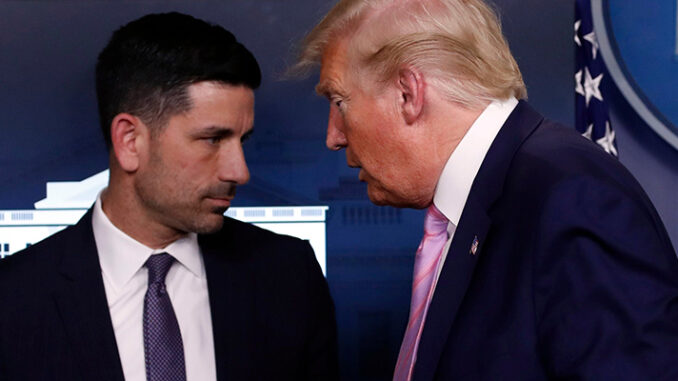
In reality, that may be the hardest Cabinet job to fill. To be sure, other executive leadership jobs are difficult. But most of them require specific expertise and set of qualifications or skills. The attorney general needs to know many aspects of the law, but in the end, he or she is just a lawyer. Likewise, the secretary of state has to understand the motivations of more than 190 other nations around the globe, but diplomacy is his or her provenance. The director of national intelligence, by statute, is required to have extensive national security expertise.
The span of responsibility for DHS, though, may well be the broadest of any single Cabinet department — and, thus, the scope of experience we look for in the secretary is equally broad. The secretary should have experience in law enforcement, to guide the largest cadre of law enforcement officers in the federal government. Likewise, it helps if the secretary understands and has experience in counterterrorism, since preventing the next terrorist attack on America is, almost by definition, the department’s core function.
And yet that barely scratches the surfaces. Other skills we might look for in a homeland security secretary include an understanding of immigration law and policy; a working knowledge of cybersecurity issues and physical infrastructure protection; grant-making experience (the department gives out billions of dollars to state and local governments); aviation and transportation security expertise; an ability to work with international partners; a familiarity with privacy and civil liberties requirements; a facility in emergency preparation, management and response (for the hurricanes and wildfires); and, of course, some understanding of biological and pandemic threats.
To this, let’s add significant managerial requirements. DHS is the third-largest Cabinet department, with more than 250,000 employees. It requires leadership skills; an understanding of procurement and human resources requirements; and, in the end, substantial political savvy to deal with one of the most challenging portfolios in American politics. If the secretary is also an effective public speaker and a confidant of the president, well, then, you have a candidate with all the necessary skills. Or, as one of us put it seven years ago, we need someone who is a manager, a leader, an expert and a political heavyweight.
And all that is only what we want in “normal” times — which is to say, the times when the risk of a worldwide pandemic or massive wildfires on the West Coast are only hypothetical.
These are hardly “normal” times. The next homeland security secretary will also need to repair a broken department: broken in morale, broken in reputation, broken in mission. The stature and regard for DHS are so diminished that only someone with a long track record of honesty and probity will be able to repair it, regardless of who is sworn in as president on Jan. 20. Anything less, and the department may very well be dismantled by Congress.
The department’s morale is destroyed. It routinely ranks as having the least-happy employees of any agency of government. Part of this is because the nature of DHS is one of saying “no” — nobody wants to be the Transportation Security Administration agent who has to tell a family that its carry-on bag contains too much liquid or the immigration officer who deports someone for violating the immigration laws. But part of it, as well, is that the focus of the department has mutated over the past four years from one of cooperation to one of confrontation. The deployment of an armed border tactical unit to Portland, Ore., to suppress protests over police brutality is just the latest symbol of disaffection between the department’s employees and the people they serve.
To take another example, Immigration and Customs Enforcement has a critical role to play in defending the homeland, but the way it has been called upon to do so in the past four years has transformed the agency (and its employees) from relatively obscure law enforcement officials to the focus of American ire. It cannot possibly be a morale boost to work for the agency and then see “Abolish ICE” resonate on social media.
The department has also lost the critical character of trustworthiness and honesty. Say what you will about DHS, but up to now, its leaders have tried to maintain the department as neutral and nonpartisan. All of the previous DHS secretaries of both political parties have striven to build the department along the model of a neutral and nonpartisan military or law enforcement organization, where the public could repose some degree (not an absolute one, to be sure) of trust and confidence.
No longer. DHS has taken to contesting political facts in the public space, and its cadre of acting leadership officials have embraced participating in partisan political dialogue. And it has, as well, been called out for simply lying in public (most recently, when DHS admitted that it submitted false affidavits during a lawsuit over the exclusion of New York from the Global Entry program). Over the next few years, the DHS secretary will have a huge challenge in rebuilding confidence in the dispassionate neutrality of the department.
Finally, the next secretary will have the challenge of refocusing the mission of the department to address present and future threats, not just those of the past. Over the past 18 years, DHS has developed into an “all-hazards” agency, charged with responsibilities concerning everything from aviation terrorism to natural disaster to cybersecurity and everything in between. In the past four years, however, Trump and his advisers have insisted that it focus on but one aspect — a threat the president persistently argues is posed by immigrants. And that policy objective has involved curtailing not just illegal immigration, but legal immigration, as well. While illegal immigration is a legitimate policy issue, the focus on it (and conflating it with legal immigration to make both seem threatening) to the exclusion of all others has skewed the department’s allocation of resources and poisoned the public’s perception of its mission. That, too, must change.
All of this is a heavy lift. It is almost impossible to imagine any one person capable of all of this. And yet, that is what the department needs in a new secretary — a hero who can rescue it from overt politicization and corruption of its critical mission.



